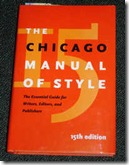If you read many of the ads out there looking for freelance writers, you may notice a proliferation of those asking for respondents to have "perfect English grammar." As a professional writer myself, I find this to be the world’s most meaningless qualification. All published writing should strive for perfect grammar, of course. Professional writers should be more likely to achieve it. However, in an imperfect world, imperfect grammar will happen.
 The problem with asking for perfect grammar is that it ignores certain realities. Some grammar rules are hard and fast. Other grammar rules are modified based on their medium. While two spaces after a period is an unbreakable rule for most printed publications, the same cannot be said for electronic publications where two spaces are considered two "special" characters.
The problem with asking for perfect grammar is that it ignores certain realities. Some grammar rules are hard and fast. Other grammar rules are modified based on their medium. While two spaces after a period is an unbreakable rule for most printed publications, the same cannot be said for electronic publications where two spaces are considered two "special" characters.
Of course, these differences could be considered differences in style versus differences in grammar, for example, the difference between AP Style and the new Yahoo Style. There are those who go so far as to distinguish punctuation from grammar, although the two are so closely interlinked that such a division is impractical.
Most problematic of all is that in order to actually appreciate perfect grammar, you have to know and understand grammar correctly yourself, which brings us to today’s little mini-grammar lesson.
When to Use A versus An
Whether for the sake of expedience or for a lack of understanding, many English teachers teach their students to use ‘a’ when the next word starts with a consonant and ‘an’ when the following word starts with a vowel. In general, this is good grammar, but eventually, a writer will notice a sentence that sounds a bit off-key when using this technique. Like hitting a B-flat when you meant to play a B, a sentence just rings a little bit wrong. However, following grammar rules in writing often is dissimilar to following the more forgiving grammar rules of spoken English.
Consider for example:
- an unique proposition
- an one of a kind offer
- a MCSE certified writer
- a X-rated movie
All of these phrases sound a little bit wrong and with good reason. The actual rule is that ‘an’ should be used whenever the following word begins with a vowel sound, regardless of how the word is spelled.
That means the correct usage in the above phrases is actually:
- a unique proposition
- a one of a kind offer
- an MCSE certified writer
- an X-rated movie
Sounds better.
As a freelance technology writer, this comes up most frequently when writing about computer industry acronyms. MCSE, for example, is Microsoft Certified Systems Engineer. That means that a writer needs to use ‘a’ when spelling it out and ‘an’ when using the abbreviation.
I am a Microsoft Certified Systems Engineer.
I am an MCSE.
The tricky part is that not all letters in acronyms or abbreviations start with a vowel sound. For example, B, C, and D all have a consonant sound. E and F, however, both have vowel sounds at the beginning. (Spell out F phonetically to see this: eff.)
Silent letters can make this tricky as well.
We are staying at a hotel.
We will be there in an hour.
Editors With Perfect Grammar Needed
I bring this up, because one of those freelance writing clients that insists on perfect grammar recently sent back edits including changing correct indefinite article usage (a and an) to incorrect usage based upon the mistaken "rule" that an should always be used before a word that starts with a vowel.
A professional editor expects pushback from writers, a freelance writing client may not. A gentle reference to the AP Stylebook can help get a client to recognize an error without damaging the relationship, but it may not be the last time the issue arises.
Either way, a pro freelance writer‘s job is always the same. Write as perfectly, informatively, and succinctly as you can based upon the client’s needs and the target audience.
If we could just do something about those darn typos…